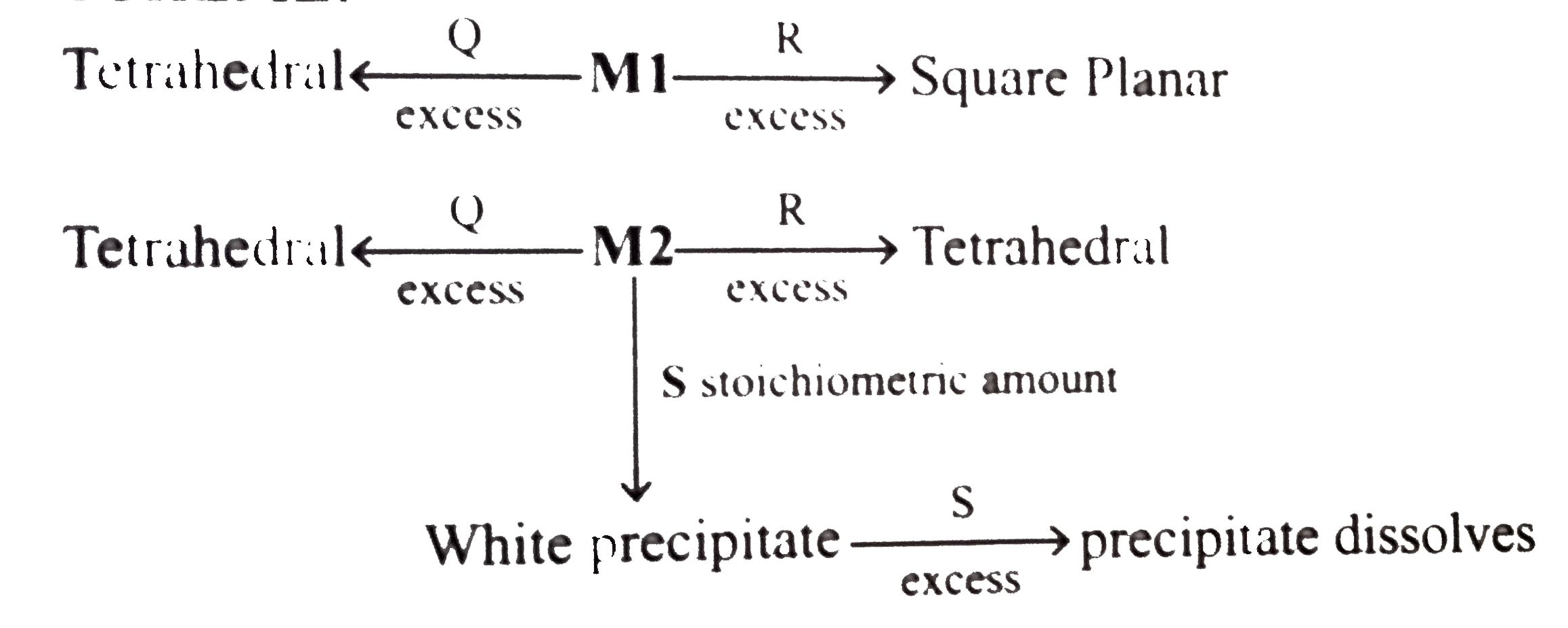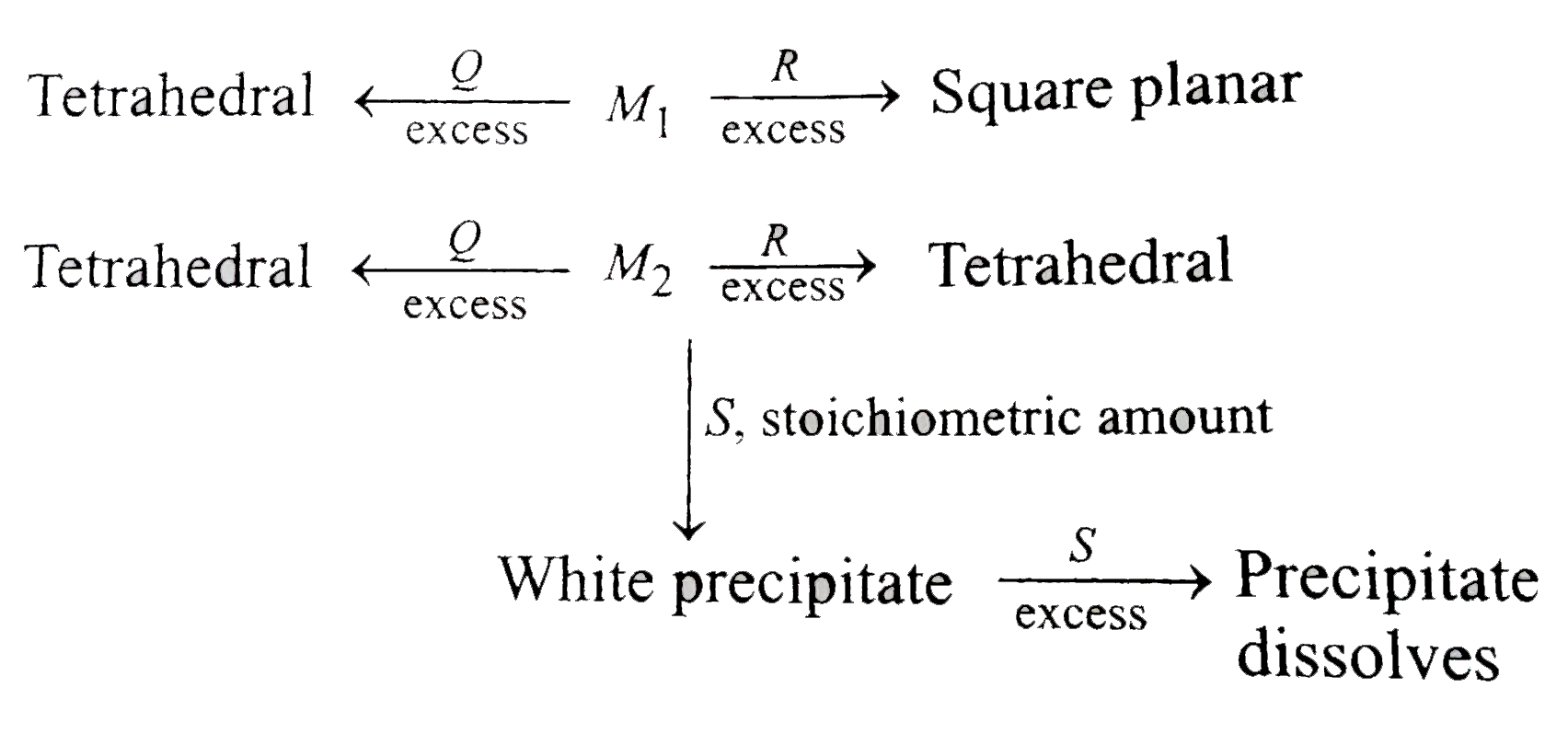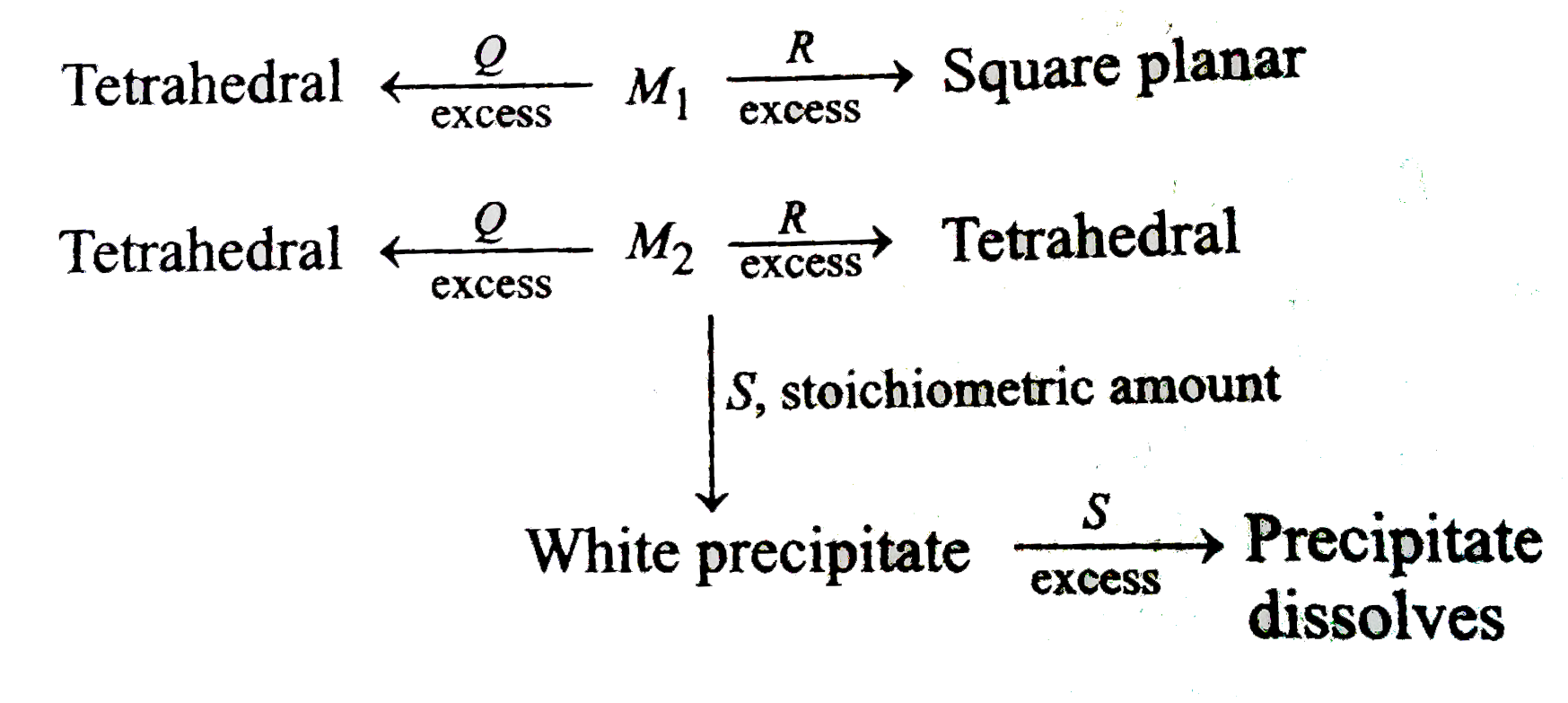An aqueous solution of metal ion MI reacts separately with reagents Q and R in excess to give tetrahedral and square planar complexes, respectively An aqueous solution of another metal ion M2 always forms tetrahedral complexs with theses reagents. Aqueous solution of M2 on reaction with reagent S gives white precipitate which dissolves in excess of S The reactions are summarised in the scheme given below: SCHEME :

what is M2 and S??
Zn2+, KCN, HCI and K4[Fe(CN)6]
Ni2+, HCI, KCN and KOH
Cd2+,KCN,HCl and Na2HPO4
Co2+, HCI, KCN and K2CrO4
The correct Answer is:B
[NiCl4]2−TetrahedralHCl(Q)←−−−−excessNi2+(M1)KCN(R)−−−−−→excess[Ni(CN)4]2−square planar
[ZnCl4]2−TetrahedralHCl(Q)←−−−−excessZn2+(M2)↓KCN(R)−−−−−→excess[Zn(CN)4]2−Tetrahedral
Zn(OH)2white ppt.KOH−−→excess[Zn(OH)4]2−
Topper's Solved these Questions
- BOOK - R SHARMACHAPTER - COORDINATION COMPOUNDSEXERCISE - Archives56videos
COORDINATION COMPOUNDS
- BOOK - R SHARMACHAPTER - COORDINATION COMPOUNDSEXERCISE - Archives56videos
COORDINATION COMPOUNDS
- BOOK - R SHARMACHAPTER - CHEMISTRY IN EVERYDAY LIFEEXERCISE - Archives11videos
CHEMISTRY IN EVERYDAY LIFE
- BOOK - R SHARMACHAPTER - ELECTROCHEMISTRYEXERCISE - Follow-up Test 117videos
ELECTROCHEMISTRY
Similar Questions
An aqueous solution of metal ion M1 reacts separately with reagents Q and R in excess to give tetrahedral and square planar complexes, respectively. An aqueous solution of anotherr metal ion M2 always forms tetrahedral complex with these reagents. Aqueous solution of M2 on reaction with reagent S gives white precipitate which dissolves in excess of S. The reactions are summarized in the scheme given ahead.
SCHEME:
Tetrahedral Q←−−excessM1R−−→excess Square planar
TetrahedralQ←−−excessM2R−−→excessTetrahedral ↓S.stoichiometric amount White pptS−−→excess.Precipitate dissolves
Reagent S is:View SolutionAn aqueous solution of metal ion M1 reacts separately with reagents Q and R in excess to give tetrahedral and square planar complexes, respectively. An aqueous solution of anotherr metal ion M2 always forms tetrahedral complex with these reagents. Aqueous solution of M2 on reaction with reagent S gives white precipitate which dissolves in excess of S. The reactions are summarized in the scheme given ahead.
SCHEME:
Tetrahedral Q←−−excessM1R−−→excess Square planar
TetrahedralQ←−−excessM2R−−→excessTetrahedral ↓S.stoichiometric amount White pptS−−→excess.Precipitate dissolves
M1,Q and R, respectively are:View Solution
Knowledge Check
- Question 1 - Select One
An aqueous solution of metal ion M1 reacts separately with reagents Q and R in excess to gie tetrahedral and sqaure planar complexes, respectively. An aqueous solution of another metal ion M2 always forms tetrahedral complexes with these reagents. Aqueous solution of M2 on reaction with reagent S gives white precipitate which dissolves in excess of S. The reaction are summarised in the scheme given below
Scheme

Reagent S isAK4[Fe(CN)6]BNa2HPO4CK2CrO4DKOH - Question 2 - Select One
In Aqueous solution, metal ion M1 reacts separately with reagents Q and R in excess to give tetrahedral and square planar complexes respectively. An aqueous solution of another metal ion M2 always froms tetrahedral complexes with these reagents. Aqueous solution of M2 on reaction with reagent S gives white precipitate which dissolves in excess of S. The reactions are summarized in the scheme given ahead

Reagent S isAK4[Fe(CN)6]BNa2HPO4CK2CrO4DKOH - Question 3 - Select One
An aqueous solution of metal ion M1 reacts separately with reagents Q and R in excess to gie tetrahedral and sqaure planar complexes, respectively. An aqueous solution of another metal ion M2 always forms tetrahedral complexes with these reagents. Aqueous solution of M2 on reaction with reagent S gives white precipitate which dissolves in excess of S. The reaction are summarised in the scheme given below
Scheme

M1,Q and R, respectively areAZn2+,KCN and HClBNi2+,HCl and KCNCCd2+,KCN and HClDCo2+,HCl and KCN
In Aqueous solution, metal ion M1 reacts separately with reagents Q and R in excess to give tetrahedral and square planar complexes respectively. An aqueous solution of another metal ion M2 always froms tetrahedral complexes with these reagents. Aqueous solution of M2 on reaction with reagent S gives white precipitate which dissolves in excess of S. The reactions are summarized in the scheme given ahead

M1, Q and R respectively areView SolutionAn aqueous solution containing S2− ions will not give:
View SolutionAn aqueous solution containing S2− ions will not give:
View SolutionOn addition of aqueous NaOH to a salt solution, a white gelatinous precipitate is formed, which dissolves in excess of alkali. The salt solution contains
View SolutionAn aqueous solution containing S2− ions will not give:
View Solution

